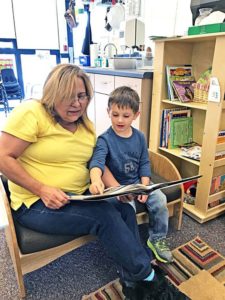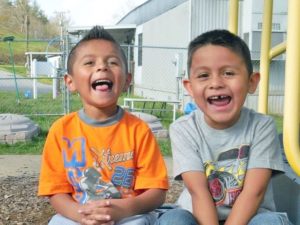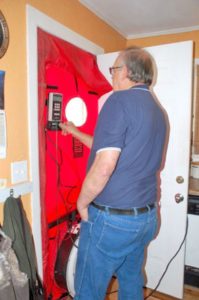This story was written by Quintin Ellison, originally published in The Sylva Herald.

Mayda Vazquez-Hernandez reads to Easton Parris. Photo courtesy of Mountain Projects.
In the grand scheme of things, when compared to a budget numbering in the billions, $2 million doesn’t amount to a thimbleful of funding.
Those federal dollars, however, provide money to help Jackson County’s neediest. If President Donald Trump’s proposed budget is adopted, seven programs at Mountain Projects face elimination, Director Patsy Davis said this week.
Weatherization. Heating assistance. Foster grandparents. Senior companions in homes and adult daycares. Specialized GED support. Self-help housing. All of these services, and more, vanish.
About 3,000 people in Jackson and Haywood counties are directly served through the programs targeted, according to Davis.
“I have been in Third World countries where governments don’t care. I have seen starving children, inadequate shelter, no health care and places where 50 is old, because people don’t live longer,” she said. “The proposed cuts are to a safety net that helps assure our country doesn’t look like that. Basic human needs must be met. You can meet them on the front end with services, or you can pay for them in our emergency rooms, premature long-term care, the court system and jails.”
It’s unclear whether other Mountain Projects programs, such as Head Start, will face funding cuts. The nonprofit also oversees housing programs with money from the U.S. Department of Housing and Urban Development.
Here are the programs facing potential cuts:
Foster Grandparents allows seniors to interact with and support young children. Open to seniors ages 55 or older, the goal is to provide step-in grandparents for disadvantaged children in the community. Last year, 60 participants across the six westernmost counties provided 50,000 hours of “extra love and help” to children, Mountain Projects Director Patsy Davis said. The foster grandparents receive small stipends in return for their service.
“I broke down and cried when I heard the things that we do might not be done,” said David Young, a foster grandparent at the Kneedler Child Development Center on the campus of Western Carolina University. “It is so sad, because this program is so needed. We go in, and maybe help a child who needs help spelling their name, or we mentor them. We love them. And it gives me a chance to get out and give back.”

Photo courtesy of Mountain Projects.
Senior Companions encourages older residents in the community to come to the aid of fellow seniors. These residents help at adult daycare or provide that extra boost if someone is to continue living at home. Volunteers receive a small stipend for their emotional and physical support; sometimes, they help with simple house chores or provide transportation.
Margie Webb of the Addie community in Jackson County has served as a senior companion for four years. She takes other seniors grocery shopping, drives them to the doctor or helps them run various errands.
“They really need these services,” she said. “Otherwise, they would stay at home and never go anywhere. As for me? I get to help people and know that I’m doing that.”
The 21st Century Community Learning Centers (CCLC) grant helps fund enrichment activities for children outside of regular classes, such as after school or during the summer.
Jackson County Schools doesn’t receive funding from the grant program – but local students do benefit from it. Western Carolina University’s Language Enhancement After-school Program (LEAP) recently applied for a 21st CCLC grant worth about $200,000.
The program provides learning activities, field trips, clubs and peer mentoring for students who are or have been part of the English as a second language (ESL) program at Cullowhee Valley School. LEAP is currently funded by the After School Quality Improvement Grant, which runs out in July.
“We would be distressed if WCU was not awarded the 21st Century Grant by the federal government, because our students at Cullowhee Valley do benefit greatly,” Jackson County Associate

Photo courtesy of Mountain Projects.
Superintendent Kim Elliott said.
Cindy Calhoun is the coordinator of LEAP. Without the 21st CCLC grant, she said the program would not exist. “All of our students who are enrolled were able to keep pace with their native English-speaking peers – or even excel, according to standardized testing data,” she said.
There are 48 students currently enrolled in the program. If LEAP receives funding, they plan to include more students.
LEAP also provides WCU students opportunities for service learning.
“A lot of WCU students come to broaden their horizons and work with students who may not speak their language and are from other cultures,” Calhoun said. “They want to make a difference in their community and this is one way they can do that.”
Low-income heating assistance money and weatherization funding that pays for Mountain Projects to help local residents stay warm and make homes energy effficient. Workers use specialized equipment to find air leaks in homes, and the programs pay for weatherization, such as adding insulation, fixing or replacing heaters, and more.
Mountain Projects is required to collect heating bills from before and after these projects. Director Patsy Davis said people show an average 30 percent savings on these monthly costs.
The Jackson County Department of Social Services also receives heating assistance funds. Director Jennifer Abshire said her department spent $162,800 this winter helping 623 households and, in 2016, spent $152,000 to help 584 households.
Community Services Block Grant: This is a $715 million program within Health and Human Services that funds more than 1,000 anti-poverty organizations nationwide. It’s on the chopping block in its entirety.

Low-income heating assistance money and weatherization funding. Photo courtesy of Mountain Projects.
Mountain Projects uses CSBG money to pay for a one-stop, single-portal-of-entry into human services. Mountain Projects set up a program that allows people who need an array of services to apply once only. Each year, about 1,500 residents of Jackson and Haywood counties move through this portal, Director Patsy Davis said.
“Sometimes, you can take the human out of human services,” she said. “It’s humiliating enough to have to ask for help. It’s even more humiliating to tell that story over and over. This is designed to prevent that.”
CSBG funding also helps pay for a supplemental GED program to help residents get their high-school diploma equivalencies. Participants receive a range of support, including tutors if needed. Jackson County government and Southwestern Community College partner with Mountain Projects on its GED program.
Self-help housing: Jackson County is about to start this program … if the funding survives. In Haywood County, where the program has been up and running for several years, 45 low-income families have put “sweat equity” into helping to build their own homes.
Out of those participating, only one homeowner has faced foreclosure for loan nonpayment, according to Mountain Projects Director Patsy Davis.
To qualify, families must have good credit; those families with one to four members must make $44,000 or less, and families with five to eight members must make $58,100 or less. Payment amounts depend on income. There’s no down payment required and the homes are 100 percent financed.
“It’s a chance for lower-wage earners to realize the American Dream,” she said. “I really hope to do this for people in Jackson County, too.”
Related story: Local Meals on Wheels to roll on … budget cut or no budget cut



